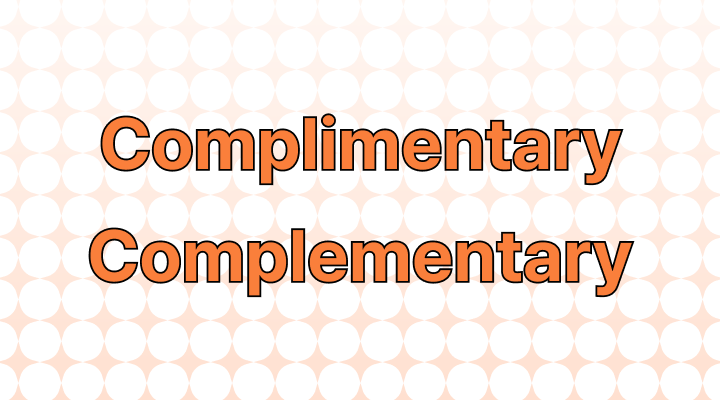"Complementary" describes things that are meant to complete each other by working together harmoniously, while "complimentary" refers to something provided as a courtesy or given for free.
The distinction between "complementary" and "complimentary" can sometimes be a source of confusion in the English language, but these words have clear differences in meaning, usage, and connotation that are essential to grasp for effective communication.
What does complementary mean?
"Complementary" is also an adjective, but it serves a different purpose. It describes things that are meant to complete or enhance each other by working together harmoniously. When two or more elements are considered complementary, they bring out the best in each other and work in unison to create a more balanced or effective outcome. For example, in art and design, complementary colors are pairs of colors that, when placed together, create visual harmony and contrast, such as red and green or blue and orange. In relationships, individuals with complementary personalities or skills often collaborate effectively because their strengths compensate for each other's weaknesses.
Example sentences
- The two colors, blue and orange, are complementary and create a striking contrast in the painting.
- Her analytical skills and his creative talents proved to be complementary in their joint project.
- The collaboration between the marketing and sales teams was highly successful because their strategies were complementary.
- The chef created a menu with complementary flavors, ensuring a harmonious dining experience.
- In a healthy relationship, partners often have complementary strengths and weaknesses that balance each other out.
- The different branches of science, such as physics and chemistry, are complementary disciplines that contribute to our understanding of the natural world.
- The yin and yang concept in Chinese philosophy represents the idea of complementary opposites in balance.
- The architect designed the building's interior with complementary furnishings and color schemes.
- The therapist recommended exercises that would strengthen the patient's muscles and improve their mobility, as they were complementary to the treatment plan.
- The diverse skill sets of the team members proved to be complementary, leading to the successful completion of the complex project.
Common idioms/phrases
- Complementary skills: This phrase describes skills or abilities that work well together and enhance each other's effectiveness.
- Their complementary skills in marketing and finance made them a formidable team.
- Complementary therapies: In healthcare, this phrase is used to describe alternative or holistic treatments that work alongside conventional medicine to promote healing.
- The patient's treatment plan includes both medication and complementary therapies like acupuncture.
- Complementary angles: In geometry, this phrase refers to angles that add up to 90 degrees.
- In a right triangle, the two acute angles are complementary.
What does complimentary mean?
"Complimentary," often mispronounced as "compliment-ary," is an adjective that refers to something provided as a courtesy or given for free. It signifies an act of kindness or generosity, where a service, item, or gesture is extended to someone without any charge. For instance, a hotel might offer complimentary Wi-Fi to its guests, meaning they provide it for free as a courtesy to enhance the guest experience. Additionally, when you receive a compliment on your appearance, skills, or work, it is a complimentary remark – a positive expression of praise or admiration.
Example sentences
- The hotel offers complimentary breakfast to all its guests.
- The airline provided complimentary headphones for passengers on the long-haul flight.
- As a token of appreciation, they received a complimentary bottle of wine from the restaurant.
- She received a complimentary spa voucher for her loyalty to the wellness center.
- The magazine included a complimentary bookmark featuring a famous quote.
- Guests were greeted with complimentary drinks upon arrival at the conference.
- The car dealership offered a complimentary car wash with every service appointment.
- The restaurant provided complimentary dessert to celebrate the couple's anniversary.
- Attendees at the event received a complimentary tote bag filled with promotional items.
- His complimentary remarks about her presentation earned him a reputation for being supportive and encouraging.
Common idioms/phrases
- Complimentary colors: This phrase refers to pairs of colors that, when placed together, create contrast and enhance each other's vibrancy. It's a common term in art and design.
- The artist used complimentary colors to make the painting visually striking.
- Complimentary breakfast: Often used in the hospitality industry, this phrase indicates that guests are provided with a free breakfast as part of their stay.
- The hotel offers a complimentary breakfast buffet for its guests.
- Complimentary remarks: This phrase refers to positive comments or praise given freely to someone.
- He received many complimentary remarks about his performance in the play.
In summary, "complementary" pertains to things that work together in harmony to complete or enhance each other, while "complimentary" relates to something given as a courtesy or for free, as well as expressions of praise and admiration. Understanding the differences between these words is crucial for clear and accurate communication, as they convey distinct concepts and ideas.
Discover more about the AI English proofreader, Engram!

Reference














